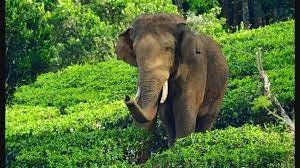On the late evening of May 25, Arikompan, a 36-year-old tusker, embarked on a daring journey to return home. After a series of destructive incidents in which he trampled several people to death, injured many more, and caused significant damage to homes and shops, the partially blind elephant was tracked by forest officials to within 100 meters of a human settlement in Kumily, a picturesque village nestled amidst spice and tea plantations in the Idukki district of Kerala, India.
Arikompan, whose name is derived from the Malayalam words “ari” meaning rice and “kompan” meaning tusker, has acquired both a distinct personality and a notorious reputation over the years. Much like his fellow pachyderms in the region, such as Chakkakompan, a wild tusker with an affinity for jackfruit, and Arisi Raja, the “rice king” of Pollachi in Tamil Nadu, Arikompan has become a well-known figure.
One of Arikompan’s defining traits is his love for rice, which often led him to raid homes and shops in the Santhanpara and Chinnakanal panchayats in search of his favorite food. However, his most recent escapade took a different turn. As he made his way back to the deep forests of the Periyar Tiger Reserve in Thekkady, located approximately 8 kilometers away on the Kerala-Tamil Nadu border, he surprisingly refrained from causing any harm to people or property. This unexpected behavior provided a glimmer of hope that perhaps Arikompan was not entirely consumed by his aggressive tendencies.
The tusker, despite his partial blindness in the right eye, was captured after a string of violent incidents that resulted in tragic consequences. Seven lives were lost, numerous individuals were injured, and at least 25 homes and shops lay in ruins. These destructive encounters left a lasting impact on the local communities, who were forced to grapple with the dangers posed by an elephant whose actions seemed fueled by both hunger and aggression.
During the months of March and April, Arikompan was observed in the company of two cow elephants and their two calves. This period, known as musth, is when male elephants experience heightened levels of testosterone and seek out mates. The presence of these companions may have contributed to Arikompan’s temporary diversion from his destructive tendencies, offering a glimpse of a more balanced and natural existence for the solitary tusker.
The return of Arikompan to the Periyar Tiger Reserve not only highlighted the need for improved human-elephant coexistence strategies but also served as a reminder of the vital role that protected areas play in preserving wildlife habitats. The reserve, renowned for its diverse flora and fauna, including the majestic Bengal tigers, serves as a sanctuary for many endangered species. Efforts to maintain the delicate balance between the needs of wildlife and human settlements are crucial to prevent further conflicts and ensure the long-term survival of these magnificent creatures.
As Arikompan disappeared once again into the depths of the forest, the local communities were left pondering the complex dynamics between humans and elephants, and the challenges that lie ahead in fostering peaceful cohabitation. The tale of this enigmatic tusker, with his penchant for rice and his eventful journey home, serves as a poignant reminder of the intricate relationship between man and nature, and the importance of striving for harmony in a world shared by diverse species.


